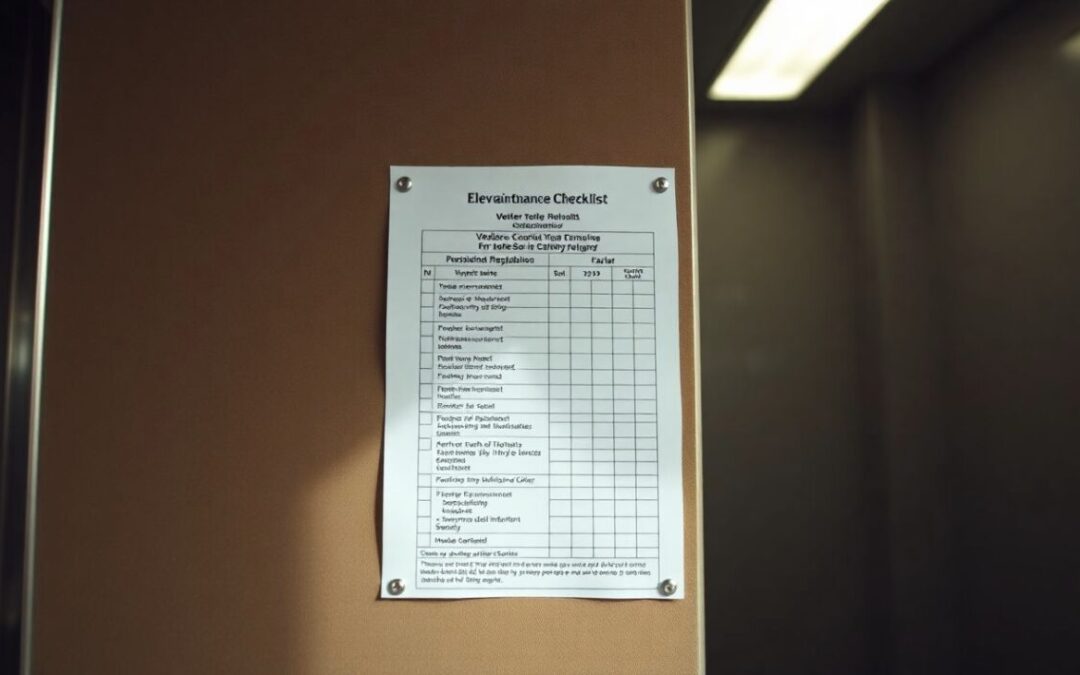Elevator malfunctions can be a major headache for building managers and owners. This playbook, developed by the Elevator Consultants, provides a blueprint for holding vendors accountable for their performance and improving maintenance practices.
The Importance of Vendor Responsibility for Elevator Services
Making vendors accountable ensures better service. Clearly established standards ensure repairs and maintenance are performed to standard. Service providers must be properly overseen to meet safety standards such as ASME A17.1.
Inadequate vendor management can lead to oversights or unwarranted spending. Strong accountability translates to:
- Cost reduction
- Client peace of mind
- Better safety compliance
- Reduced risks through active monitoring
- Better outcomes for building owners
Accountability ultimately ensures better decision-making, timely action, and consistent performance.
Actionable Steps for Implementing Vendor Responsibility
Set Clear Performance Expectations
Set goals that cannot be misunderstood. Contracts should clearly state written deliverables, deadlines, and expected quality. Vendors should understand at all times what is expected of them.
Break these standards into measurable aspects. Track performance against deadlines and tasks through monthly reviews. Action agreement commitments ensure certainty in cases where vendors fail to meet targets.
Define Measurable Goals and KPIs
Clear performance expectations lead to measurable goals and KPIs. They track supplier performance and make vendors accountable. Apply compliance rates, defect rates, and order accuracy as leading indicators.
For example, a 90% or more compliance rate displays superior supplier reliability.
It is critical to customize KPIs to ensure maximum operational effectiveness. Avoid spreadsheets; utilize central systems for better tracking. This method facilitates evidence-based decision-making with issues detected earlier.
“KPIs transform vendor management to actionable intelligence.”
Use Detailed Agreements and Contracts
Comprehensive agreements outline definite expectations for suppliers. Agreements should have responsibilities, deadlines, and goals to avoid any sort of vagueness. Introduce communication protocols so that both sides are in touch regularly.
Monitor these contracts easily with centralized contract management software. They reduce errors and keep up-to-date records. Monitor prices and deliverables periodically to ensure terms are being met. Accurate records facilitate easy checking of performance and payment in due course.
Leveraging Technology for Better Accountability
Use intelligent tools to track vendor work to detect issues early and improve service quality.
Installation of IoT for Real-Time Monitoring
IoT sensors provide real-time information from elevators. These details show issues in real time and enable timely alerts. Timely alerts enable critical staff to respond quickly to repairs before small issues turn into major problems.
Interconnected facilities also track performance. Operations managers use this so that preventive maintenance can be scheduled when needed. Consistent data helps ensure that contractors are performing to standard, which improves vendor accountability in facilities management.
Use Vendor Scorecards to Assess Performance
Vendor scorecards are critical performance measurement tools to keep elevator service vendors accountable. Scorecards apply benchmarked measurements to measure critical areas like delivery, cost, and responsiveness.
Vendor Info: Track company name, contact, and service history.
Performance Metrics: Track uptime, repair time, and maintenance schedules.
Delivery Metrics: Evaluate timeliness of response for scheduled visits or emergencies.
Cost Metrics: Monitor costs compared with approved terms or budget levels.
Responsiveness Metrics: Measure how quickly vendors reply to questions or issues.
Scorecards make assessments simpler. Regular reviews eliminate guesswork. Scorecards identify risks and provide transparency, which enhances vendor relations and brings accountability.
Building Effective Vendor Relationships
Strong vendor relationships thrive on a foundation of trust, transparency, and common goals.
Regular Communication and Feedback
Continuous communication helps foster trust and better vendor relationships. Open communication helps maintain respect between parties and also ensures understanding of expectations. Use continuous feedback to address issues early.
Provide ongoing performance feedback to encourage engagement and development. Open communication develops strong, long-term relationships.
Constructive criticism enhances service quality in the long term. Criticize issues with suppliers tactfully and compassionately. Compliment their effort while pointing out areas that need improvement. This helps to increase supplier participation and make joint development simpler.
Matching Expectations During Onboarding
Communicate clearly with suppliers during onboarding. Define delivery timelines, quality requirements, and service level agreements (SLAs) in advance. This prevents confusion down the line and establishes a solid basis for vendor accountability.
Monitor suppliers’ performance from day one using measurable KPIs. Discuss them in advance so everyone is aligned. Clear communication establishes trust and develops supplier relations over time.
Conclusion
Keeping vendors accountable maintains your building operating at its best. Make it all possible with AuditMate. Their software tracks performance, monitors contracts, and guarantees punctual maintenance.
Save time and decrease downtime with their tools. Contact AuditMate today to learn more!
FAQ
- What is “The Elevator Service Playbook”?
It is a guide to help enterprises manage elevator service firms and make them more accountable. - How do I get my vendor to perform as promised?
Establish definitive terms of service, track their work regularly, and review reports to ensure they are meeting standards. - Why is it necessary to hold vendors accountable?
Accountability guarantees consistent elevator service, minimizes downtime, and protects your investment. - Can a playbook support long-term vendor relationships?
Yes, it offers guidance regarding communicating expectations early on and keeping communication lines open throughout the relationship.

